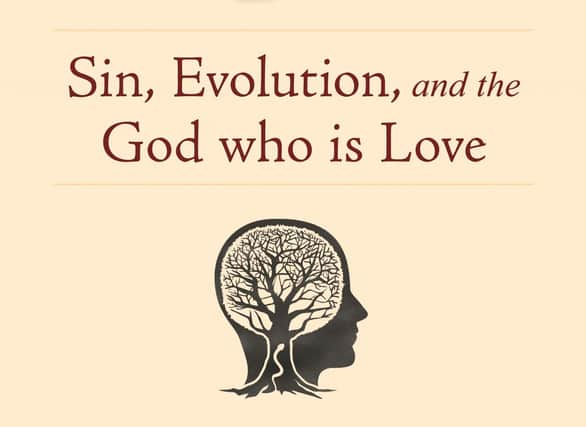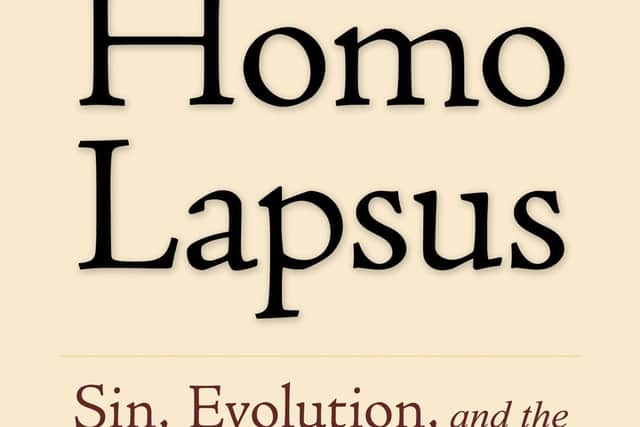Must Read of the Week - Homo Lapsus: Sin, Evolution and the God Who is Love by Niamh Middleton


This article contains affiliate links. We may earn a small commission on items purchased through this article, but that does not affect our editorial judgement.
Scientists and Christians have been at war since Darwin introduced his theory of evolution in the 1800s. Now, after almost 160 years of bitter fighting, a groundbreaking new book promises to reconcile the two camps and even heal old wounds, writes Lucy Bryson.
When Charles Darwin introduced the theory of evolution through natural selection in 1859, the scientists and theologians of the day argued over it fiercely. Today, almost 16 decades later, that wide-ranging debate on evolution continues as they battle for leadership and for human hearts and minds.
For some, palaeontology, genetics, zoology, molecular biology and other fields of science have already debunked religious explanations for the origins of man in all its forms. Echoing the Enlightenment scholar Pierre-Simon Laplace, they assert that the notion of a divine entity is not required for this hypothesis.
Others, such as creationists, refute all or part of Darwin’s theory of evolution and instead assert that God created reality, including the universe and its contents, through divine intervention.
But somewhere between strict Darwinism and the fundamentalist view that evolution simply didn’t happen lies what the Irish academic and theologian Dr Niamh Middleton believes is the truth: science and Christianity are complementary.
Her new book, Homo Lapsus: Sin, Evolution and the God Who is Love, makes a compelling argument that the long-standing gap between evolutionary theory and Christianity can not only be bridged but also reconciled. The two, she says, work in synthesis to provide a deeper understanding of the origins of evil and the existence of an altruistic, beneficent deity.


Contrary to the assertions of Neo-Darwinists, evolutionary theory provides empirical evidence that supports, rather than undermines, the notion of ‘original sin’ that has left Christianity fighting what Middleton describes as a “rear-guard action” to hold onto its purpose. She posits that there are evolutionary explanations for ‘sinful’ behaviour and that the scientific position (reference is made to the ‘selfish gene’ as identified by Richard Dawkins) does not in any way contradict Bible teachings. Her introduction adds, “It is my profound conviction that the reconciliation of science and the humanities on the question of human nature and how it should be defined is the most important task now facing both fields”.
Middleton, a lecturer at Dublin City University, Ireland, spent fifteen years (meticulously) researching the book, which falls broadly into the popular science genre. Comparisons can be drawn between Middleton’s work and that of the Israeli writer Yuval Noah Harari, ‘Sapiens and Homo Deus’. Both critically examine how moral events have impacted the course of history and how ongoing scientific advances could, if not used with caution, lead humanity on a dark path to a not-too-distant dystopian future.
But while Harari approaches the subject from an atheist perspective, Middleton writes from a Christian viewpoint arguing that mankind’s descent into ‘sin’and its wide-reaching consequences was not inevitable; it was the free choice of early humans that led to what the Bible calls ‘the fall of man’.
She also argues, passionately, that with scientific power and political progress comes great responsibility and the need for religious governance. The rise of ‘scientism’ – a blinkered belief in power and truth of scientific knowledge and techniques – is dangerous. A “head in the sand” Christian viewpoint that refuses to engage in dialogue with science is also unhelpful.
Only by reconciling the two (which includes Darwin’s theories and discoveries, which are referenced throughout) can we make progress. “As Darwin himself pointed out, if God is responsible for designing human morality either directly or indirectly, then God is responsible for human evil”. Middleton engages fully with Darwin’s challenge, and in so doing achieves a productive synthesis between the scientific and Christian accounts of human nature.
At a time of increasing unrest and political instability, the message in Homo Lapsus: Sin, Evolution and the God Who is Love is more apt than ever. There are nods to #MeToo (and to the arrogant bravado and bluster of powerful males), and some powerful descriptions of behaviour in the animal kingdom that will fascinate anybody with a passing interest in the natural world (one fascinatingly gruesome example being the description of ‘altruistic suicide’ among aphids attacked by parasitic wasps).
Whether you are a sceptic of Christianity or a Christian who needs to be better equipped to defend the faith in light of the latest scientific advances, Middleton’s work is an engaging must-read.
Dr Niamh Middleton is a lecturer in Moral and Systematic Theology at Dublin City University (DCU), and a leading authority in the study of human origins. Her new book, Homo Lapsus: Sin, Evolution and the God Who Is Love, is described as a scholarly but accessible reconciliation of evolutionary thinking with Christian belief. Homo Lapsus: Sin, Evolution and the God Who Is Love by Niamh Middleton (Deep River Books) is available on Amazon UK from today priced £11.44 in paperback.
Exclusive Q&A with Dr Niamh Middleton


We sit down with the author of Homo Lapsus: Sin, Evolution and the God Who Is Love to chat about the dangers of scientific advances and the terrible prospect of a dystopian future.
Q: For those unfamiliar with the concept of ‘Original Sin’, can you outline what is meant by the term and how it is relevant in today’s society?
A: ‘Original sin’ literally refers to a deleterious moral event that occurred at the origin of our species. It is more or less synonymous in the public mind with the ‘Fall’ of Adam and Eve as depicted in the Old Testament. Since Christianity advocates an all-knowing, all-powerful, all-loving God, it has to explain the existence of evil and suffering in the world. It does this by asserting that God gave humans free will and they chose to disobey Him, hence releasing the forces of evil into the world. With the emergence of the doctrine of evolution in the 19th century, much of Christianity has accepted that the Genesis accounts of direct creation and a first sinning pair are largely mythological. We now know that God creates through natural processes, and that the first humans were most likely to have been a group rather than a pair.
The scientific doctrine of evolution has caused much controversy, and not just in those Christian sects that reject evolution and insist on a literal interpretation of Genesis. In the academic humanities where I teach, for example, as well as to much of the general public, the evolutionary perspective on human behaviour is unpopular. This is because it could be used to justify sexism, racism, white supremacy and the patriarchy generally. Yet the evidence in its favour is overwhelming which is why writers of the calibre of Yuval Noah Harari are now claiming that in order to progress as a species and avoid dystopian scenarios we have to take account of our prehistory, which he terms ‘biology’. He argues that the walls in universities between biology departments and those of law and politics must come down. For me, this is where the doctrine of an original sin comes in.
I believe that it has attained a new relevance in today’s society, due to the fact that it is near identical to the Darwinian account, yet its explanatory power for human behaviour is so much greater. Evolutionary science just presents us with bald facts. This is how we evolved, we are genetically determined to a high degree. The doctrine of a primal ‘Fall’ however reassures us that the traits of greed, aggression and the lust for power that have caused so much damage to our species can in no way be justified. Further, they did not have to evolve and can be healed by God’s grace. They are not set in genetic stone.